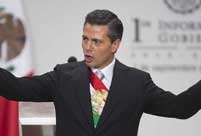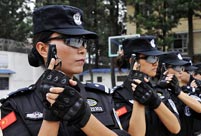 China's new-type guided missile frigate 'Bengbu' in live fire training
China's new-type guided missile frigate 'Bengbu' in live fire training
 China’s weekly story (2013.8.10 - 8.23)
China’s weekly story (2013.8.10 - 8.23)
 Flight team performs first show abroad
Flight team performs first show abroad
 With parents bedridden, 12-year-old boy becomes pillar of the family
With parents bedridden, 12-year-old boy becomes pillar of the family
 Top 10 private Chinese enterprises 2013
Top 10 private Chinese enterprises 2013
 The most gorgeous Chinese women in the eyes of foreigners
The most gorgeous Chinese women in the eyes of foreigners
South Korea's defense ministry said Tuesday that the Democratic People's Republic of Korea (DPRK) has made headway in its capability to weaponize nuclear program.
"(The DPRK's nuclear program) was at a developmental and experimental stage till 2010, but it has developed into a real threat in 2013 that can actually be weaponized and used at any time," the Defense Ministry said in a report to the parliamentary defense committee.
A week earlier, South Korean President Park Geun-hye urged the DPRK to give up its nuclear weapons program, denouncing that Pyongyang was still adhering to the nuclear weapons development despite oppositions from international communities in unison.
The DPRK said in March that it would restart operations at the Yongbyon nuclear complex by refurbishing and re-operating the five- megawatt graphite moderated reactor that had been mothballed and disabled since October 2007 under an agreement reached at the six- party talks.
The Washington-based Institute for Science and International Security (ISIS) said last month that the roof size of the building in Yongbyong, which houses centrifuges for uranium enrichment, has doubled since March, hinting at an expansion of Pyongyang's nuclear capability.
Pyongyang test-fired a long-range rocket last December and conducted its third nuclear test in February, escalating tensions on the Korean Peninsula. The actions caused additional sanctions by the U.N. Security Council against the DPRK.
As the DPRK has strengthened its nuclear and missile capacity, Pyongyang would more likely misjudge Seoul's defense capability if Seoul regains its wartime operational control from Washington in Dec. 2015 as planned, the defense ministry said.
South Korea and the U.S. have been reportedly discussing whether to reschedule the wartime operations control transition. Seoul handed over its operational control to the U.S.-led U.N. troops during the 1950-53 Korean War, but it regained its peacetime operational control in 1994.
 Mexican president delivers first State of Nation address
Mexican president delivers first State of Nation address Highlights of MAKS 2013 Int'l Aviation and Space Show
Highlights of MAKS 2013 Int'l Aviation and Space Show  10th China-ASEAN Expo opens in Nanning
10th China-ASEAN Expo opens in Nanning Baby born to save his sister - the story of a savior sibling
Baby born to save his sister - the story of a savior sibling Lady of mystery: Female SWAT team in prison disclosed
Lady of mystery: Female SWAT team in prison disclosed  Single mother, baby live in KFC restaurant for months
Single mother, baby live in KFC restaurant for months Fan Bingbing poses for Malaysian magazine Citta Bella
Fan Bingbing poses for Malaysian magazine Citta Bella Zhang Xinyi covers COSMOPOLITAN
Zhang Xinyi covers COSMOPOLITAN A collection of bizarre rooftop buildings around China
A collection of bizarre rooftop buildings around China Putin intimate contacts with marine animals
Putin intimate contacts with marine animals China's frigate 'Bengbu'in fire training
China's frigate 'Bengbu'in fire training Fresh students 'forced' to register in university independently
Fresh students 'forced' to register in university independently 2013 Taiwan Int'l Tourism Expo kicks off in Taipei
2013 Taiwan Int'l Tourism Expo kicks off in Taipei Photo story: Take a gap year
Photo story: Take a gap year Nokia's Global Headquarters: visiting a declining empire
Nokia's Global Headquarters: visiting a declining empireDay|Week|Month